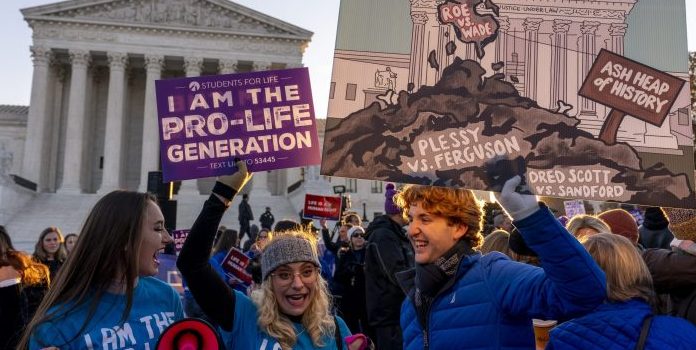(Headline USA) In the nearly two months since the Supreme Court indicated openness to reversing the half-century-old Roe vs. Wade decision, money has poured into the political fundraising arm of the pro-life Susan B. Anthony List.
The organization secured $20 million in pledged financial contributions, five times more than it has had at the outset of an election year over its 30-year history, according to figures shared with The Associated Press.
Before the recent surge, the group had already signed off on its largest-ever political budget, $72 million, for 2022. That’s nearly $20 million more than it spent in 2020, a year that included a presidential election.
The cash pile virtually guarantees that the Supreme Court’s abortion ruling, anticipated by the summer, will do little to quell what has become one of the most animating issues in the United States. Abortion opponents say they will pump their newfound resources into the November elections.
Once a decision is issued, “there will be a lot of focus on all the states and the midterm elections,” said Marjorie Dannenfelser, the president of Susan B. Anthony List.
The Supreme Court is considering a Mississippi law that bans abortions after 15 weeks. If the law is upheld, anti-abortion activists said much of the attention would shift to Wisconsin, Michigan, Pennsylvania and Kansas. These are states with Republican legislatures but Democrats in the governorship, each of whom is up for election in November.
If the Supreme Court overturns the Roe v. Wade ruling that permits women nationwide the right to an abortion, governors in Michigan and Wisconsin would be powerless to overturn restrictions in their states that were already in place before the 1973 decision.
But these governors would be the only obstacle to new measures passed by GOP legislatures, including outright bans on the procedure.
A Supreme Court decision is “really just the beginning of the work,” said Terry Schilling, president of the socially conservative American Principles Project. “Groups have actually been really well-connected with state leaders and investing in campaigns at the local level in these swing states, trying to win control in divided governments.”
Supporters of abortion, already feeling a heightened sense of alarm by the prospect of a defeat at the Supreme Court, are well aware of how important the governors’ races may be to their cause.
“Really truly, governors in many states are going to be our backstop,” said Jenny Lawson, vice president of organizing and electoral campaigns for Planned Parenthood Action Fund. “As the decisions come down to the states, these governors are the ones who can protect access.”
She declined to specify how much money the group was budgeting to support candidates who back abortion.
Some of the Democratic governors up for reelection are increasingly highlighting their commitment to protecting some form of access.
“And as long as I’m governor, that’s what I’ll do,” Wisconsin Gov. Tony Evers said during a news conference last week marking the 49th anniversary of the Roe decision.
“I’m proud to stand with so many Michiganders to protect the right to safe and legal abortion,” Michigan Gov. Gretchen Whitmer tweeted last week on the same day organizers of a ballot drive to enshrine abortion in the state constitution cleared a procedural step.
Over the weekend, Whitmer tweeted that the right to abortion “hangs by a thread” in the Supreme Court.
For their part, abortion opponents are undeniably upbeat as the Supreme Court decision nears. Thousands gathered on a bitterly cold day in Washington last week for the March for Life, expressing joy and optimism about the prospect of Roe being overturned.
But the political fallout from such a move could be volatile for both parties. A decision drastically reducing access to abortion could energize Democrats heading into the fall campaign.
The issue is already rising in priority for Democrats, according to a December poll from The Associated Press-NORC Center for Public Affairs Research.
The poll found that 13% of Democrats listed abortion or reproductive rights as an issue they want the federal government to address. That’s up from less than 1% of Democrats who named it as a priority for 2021 and 3% who listed it in 2020.
Lawson predicted a court ruling sharply restricting or ending federally mandaded access to abortion would “drive anger and outrage and cause a realignment at the voting booth.”
There’s a risk for religious conservatives as well, who have devoted decades of work to the issue and formed an unlikely alliance with Donald Trump to achieve their goals.
If Trump’s three Supreme Court nominees—including court moderates Brett Kavanaugh and Amy Coney Barrett—fall short of overturning Roe or agree to some sort of compromise, conservatives could be deeply disappointed and feel less interested in participating in the midterm elections.
The GOP has been stung before, notably when Republican-appointed Chief Justice John Roberts helped uphold President Barack Obama’s signature health care law, another issue that had galvanized the right. Roberts has gone on to side with the liberal block on many other issues, sometimes helping deliver to it a majority verdict.
The additions of Kavanaugh and Barrett, far from reinforcing the court’s conservative arm, have only made it that much less predictable.
But for now, opponents say they’re buoyed by a sense of momentum.
“It’s different now,” Dannenfelser said.
Adapted from reporting by the Associated Press

